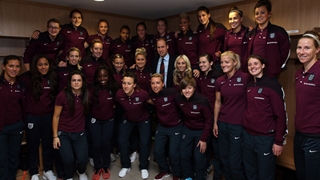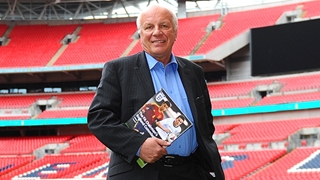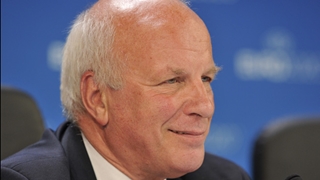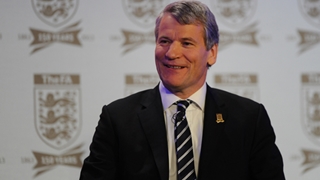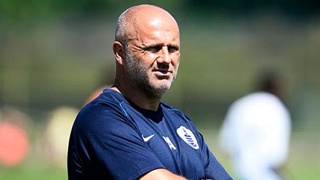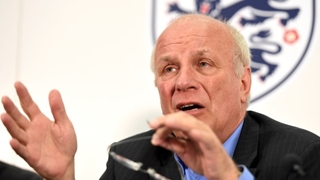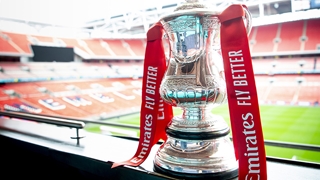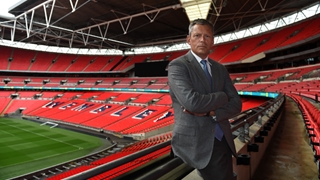
The 54-year-old kicked off his first day as chief executive officer by addressing staff at Wembley Stadium and St. George’s Park – and told TheFA.com that he was determined to bring about lasting change in English football.
“As an outsider I see football as being very tribal and sectionalised. I don’t hear much discussion about the English game. I hear the FA agenda, the Football League agenda, the Premier League agenda and the national game agenda.
Martin Glenn's CV
Age: 54
Educated: St Francis of Assisi Comprehensive, Aldridge, W Midlands
University: Merton College, Oxford
Employment history
2013-15: CEO, United Biscuits
2006-13: CEO, Birds Eye Iglo
1992-06: CEO, Pepsico UK and Ireland
1992-2006: CEO, Walkers Crisps
1988-92: Marketing manager, Mars Petcare
1981-84: Marketing manager, Cadbury Schweppes
Foreign languages spoken: German
Interests: Running, Wolverhampton Wanderers
“But I think there is much more that unites the various parts of English football than that divides it, so I think that the Premier League would be really happy if the England national teams were spectacularly successful.
“Why? It’s going to put more people through the turnstiles and more people will be interested in watching football, so it is good for the commercial side of the game.”
As well as being a former board director at Leicester City and a Level One-qualified coach, Glenn has a cast-iron background in the business world, formerly working as a CEO for Walkers, Pepsi, Birds Eye and United Biscuits.
He was responsible for hiring Gary Lineker to promote the crisps brand, and he casts his mind back to the supermarket aisles when he lays out on how The FA should work with other leaders in football.
Glenn said: “I am a big believer in relationships – not for the sake of them – but that relationships with honesty around objectives can always get things done.
“If you are a supplier to the big-four supermarkets, even if you’re as big as Coca Cola, you don’t get success by threatening Tesco. You work with them to explain why your product is useful, why it is in their interests for them to sell them, so you build a commercial understanding.
“I think the same is true of football. You will get more deep-rooted improvement if you work together and drive to a common agenda, which is making the England teams more successful and improving grassroots football.”
Glenn is aware that expectations are high, not least from The FA’s Chairman Greg Dyke, who has outlined the aim of England winning the men’s World Cup in 2022 and the Women’s tournament a year later.
“I know exactly why he did it and I totally support it. Unless you have some superordinate goal to drive an organisation you won’t get there,” he added.
“At the end of the day it’s not the only thing that will define success. [Premier League chief executive] Richard Scudamore said to me when I first met him: ‘The irony is The FA can do a lot of things over the next few years in terms of improving the grassroots game but your reputation is going to be made on whether the English national team does well or not.’
“The awkward thing about World Cups is that a lot of other teams want to win it as well but I really support that goal.
“Winning the World Cup in 2022 is not a pie-in-the-sky hope”
Martin Glenn
“When John F Kennedy said he wanted to put a man on the moon by 1970, everyone thought he was bonkers. But he put NASA in place and gave them funding. There were no guarantees but everyone, including the janitor, knew that the aim was to get a man on the moon by 1970 and they did it by the end of the decade.
“Winning the World Cup in 2022 is not a pie-in-the-sky hope. It is the kind of ambition that should catalyse all ambitions to do things a bit differently.
“Because let’s face it – doing the same thing, after 49 years of not winning anything – might suggest the definition of madness.”
Glenn admits life could have been easier had he stayed in the industry he has served for 30 years – but he is ready to accept the scrutiny that comes from holding one of the most senior positions in football.
“I could have done another five years working in the food industry but I knew that it was not going to provide me with the kind of challenges that I am going to get here, and I am a big believer of the fact that learning things keeps you young,” he said.
“The driver for me was that football is a really important thing for society. There is something that motivates me – not in so much as giving something back – but to get more involved in the more social aspect of life than I have in previous businesses.
“It is partly a patriotic thing, part a sense that it is an opportunity to improve where we are in football, and partly a challenge. I love the game and have experienced various parts of it – I have been on the board at Leicester, I have a coaching qualification and I get the sense we can do better.”
Glenn is well aware that, as the eighth CEO at The FA in 17 years, he will need to outstay most of his predecessors if he is to bring about the success he craves.
He said: “The average tenure of two years is not enough – in any leadership role – to get anything done.
“So I am not sure how long I will need but to me the biggest thing that I can achieve is a wider consensus around English football to promote the kind of things that all the stakeholders are interested in, which is improved environments for grassroots through to the improvement of the national teams.
“In football you have the fans who are very, very important – the heart and soul of it all”
Martin Glenn
“Secondly I am really keen to make women’s football even bigger than it is today. That is a massive opportunity. I want football to be popular in 100 and 200 years’ time, and the women’s game plays a big part in that.
Central to everything, Glenn says, are the fans: “In football you have the fans who are very, very important – the heart and soul of it all.
“They are what we are here for, whether it is giving them good value for money or a sense of pride in the national team. The people who play on a Saturday or Sunday – I think they are customers too.
“The fans are a group of people we ought to revere more and it is down to the stakeholders – The FA, the Premier League and the Football League – to find a way of making progress that is mutually advantageous.”
Glenn’s own experience as a fan has been forged at Molineux, where he was taken as a child by his uncle. He regrets missing Billy Wright’s golden years of the 1950s but says there have been “enough highs to keep me going.”
“I was born in the year Wolves last won The FA Cup, so there haven’t been many glory days but there have been many great events.
“Winning the League Cup in 1980 against Nottingham Forest was a thrill, getting to the play-off final in 2003 and winning in Cardiff was just a great day.
“Having a decent spell under Mick McCarthy in the Premier League was good, even if it wasn’t always easy.
“And then you have the recent phase under Kenny Jackett, and I genuinely think he is a top-quality manager. I enjoy watching Wolves playing football now more than I did a few years ago.”
But as immersed as he is in fan culture, Glenn was at pains to point out that he would not be a populist CEO who sways to public pressure.
“We didn’t get the 2018 World Cup. We learned along the way that the English FA isn’t that popular around the world of international football”
Martin Glenn
“You will always be judged by results, and any football decision is very divisive because everyone has a point of view. Don’t look to be popular, look to be right.
Before any end goal is reached, Glenn agrees that The FA can do more to modernise its image, both in this country and overseas.
“The reputation of The FA at home and abroad isn’t where we would like it to be. So if you take it at home we are seen as being the wisdom of crowds – old men in blazers.
“That doesn’t capture the truth of what we do but I think it does inhibit the application of ‘soft power’ across the game.
“If The FA is seen to be modern, dynamic, embracing of change and being creative, that will be a far better platform to lead change than perhaps where we are today. The same is true for where we stand internationally.
“We didn’t get the 2018 World Cup. We learned along the way that the English FA isn’t that popular around the world of international football.
“Let’s work at that, not for popularity’s sake but that our regard would grow because people would see the immense change that we are wielding to make sure The FA is a progressive organisation, and the immense changes that we can make in English football.
“We will grow in influence across the game not by things we say but by things we do.”
Chief among those is to bring a better understanding of The FA’s role in governing football.
Glenn says: “Most people haven’t got the first clue of what are the roles of the Premier League, The FA and the Football League.
“We have to build a coalition with English football as the objective. We need to get better at that and find out what The FA’s role is, and collaborate with all the other people that deliver it.
“So when they see the new head of The FA they are thinking ‘is he going to bring greater success to the national teams, and for those playing the game, is the playing experience going to get better?’ Those are not bad aims to have."





